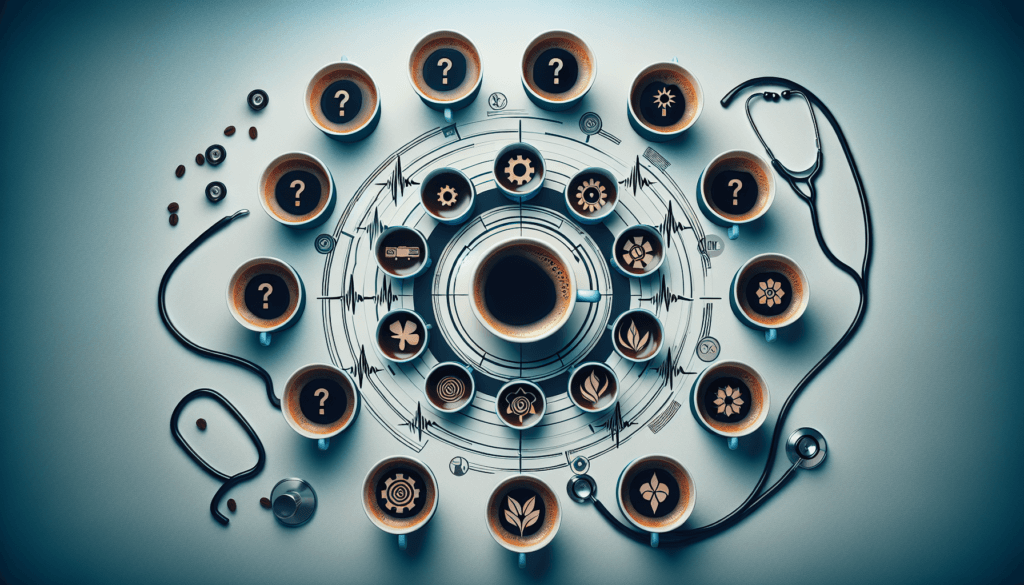Imagine a world where your mornings start with sipping on a steaming cup of coffee, followed by another, and another… until you’ve reached a total of 8 cups. While that may sound like a coffee lover’s dream come true, have you ever wondered what the consequences might be? In this article, we will explore the potential impacts of consuming 8 cups of coffee a day and unveil the effects it could have on your body and mind. So, grab a mug of your favorite brew, sit back, and let’s explore the intriguing possibilities that await when you indulge in that much caffeine.

The Effects of Caffeine on the Body
Caffeine, a natural stimulant found in various beverages and foods, can have several effects on the body. Whether you need a boost of energy in the morning or a pick-me-up in the afternoon, caffeine can offer increased alertness, improved concentration, a boost in energy levels, and enhanced physical performance.
Increased Alertness
One of the most well-known effects of caffeine is its ability to increase alertness. Through its interaction with adenosine receptors in the brain, caffeine blocks the effects of adenosine, a neurotransmitter that promotes sleep and relaxation. As a result, you feel more awake and alert after consuming caffeine.
Improved Concentration
Alongside increased alertness, caffeine can also enhance your concentration. It stimulates the central nervous system, leading to improved focus and mental clarity. This can be particularly helpful when you’re working or studying for long periods of time and need to stay on task.
Boost in Energy Levels
Caffeine acts as a mild stimulant, providing a temporary surge in energy. It works by binding to adenosine receptors, which triggers the release of adrenaline. The release of adrenaline leads to increased heart rate and blood flow, providing a sense of energy and wakefulness.
Enhanced Physical Performance
Caffeine has been shown to improve physical performance, making it a popular choice amongst athletes. It stimulates the release of stored fats, allowing them to be used as a source of fuel during exercise. This can lead to increased endurance and delayed fatigue, helping you push through your workouts more efficiently.
Recommended Caffeine Intake
While caffeine can offer numerous benefits, it’s important to consume it in moderation. The recommended daily limit for caffeine consumption varies depending on age, overall health, and individual sensitivity.
Standard Daily Limit
For most healthy adults, consuming up to 400 mg of caffeine per day is considered safe. This is approximately equivalent to four cups of coffee. However, it’s important to note that caffeine content can vary depending on the beverage or food item. It’s always a good idea to check the labels or do some research to determine the caffeine content of your favorite drinks and snacks.
Effects of Excessive Consumption
Consuming excessive amounts of caffeine can lead to a variety of negative effects. These may include increased heart rate and blood pressure, digestive issues such as stomach discomfort or acid reflux, sleep disruptions, and even symptoms of dependency and withdrawal when caffeine intake is suddenly reduced or stopped.
Potential Benefits of Drinking 8 Cups of Coffee a Day
While consuming eight cups of coffee a day may seem excessive, there can be potential benefits when done in moderation.
Rich Source of Antioxidants
Coffee is rich in antioxidants, which help protect your body from damage caused by free radicals. These antioxidants can reduce inflammation and oxidative stress, potentially reducing the risk of certain diseases such as heart disease and certain types of cancer.
Improved Mood and Mental Health
The caffeine in coffee can have a positive impact on mood and mental health. It stimulates the release of dopamine, a neurotransmitter associated with pleasure and reward. This can contribute to an improved mood and a sense of well-being.
Reduced Risk of Certain Diseases
Research has suggested that moderate coffee consumption may be associated with a reduced risk of certain diseases. Regular coffee drinkers have been found to have a lower risk of developing conditions such as Parkinson’s disease, type 2 diabetes, and certain liver diseases. However, it’s important to note that individual responses to coffee can vary and that further research is needed to fully understand the relationship between coffee consumption and these health outcomes.
Potential Risks and Side Effects
While there are potential benefits to drinking coffee, it’s also important to be aware of the potential risks and side effects associated with excessive consumption.
Increased Heart Rate and Blood Pressure
Consuming too much caffeine can lead to increased heart rate and elevated blood pressure. This can put additional strain on your cardiovascular system and may increase the risk of heart-related issues, especially if you have a pre-existing heart condition.
Digestive Issues and Stomach Discomfort
For some individuals, drinking coffee can lead to digestive issues such as acid reflux, stomach discomfort, or even an increase in bowel movements. This can be particularly problematic for individuals with pre-existing gastrointestinal conditions.
Sleep Disruptions and Insomnia
Caffeine is a central nervous system stimulant, and consuming large amounts close to bedtime can disrupt your sleep patterns. If you’re sensitive to caffeine, it’s best to avoid consuming coffee or any caffeine-containing beverages in the evening to promote better sleep.
Dependency and Withdrawal Symptoms
Regular and excessive consumption of caffeine can lead to dependency. When you consume caffeine regularly, your body can become accustomed to its effects, and you may experience withdrawal symptoms such as headaches, irritability, and fatigue when you reduce or stop your caffeine intake abruptly.

Impact on Hydration and Urinary Output
There is a common belief that caffeine can cause dehydration due to its diuretic effect. However, the diuretic effect of caffeine is relatively mild and does not outweigh the hydrating effects of beverages that contain caffeine.
Diuretic Effect of Caffeine
Caffeine is a mild diuretic, which means it can increase urine production. However, the diuretic effect is typically offset by the fluid intake from caffeine-containing beverages. In other words, the fluids you consume in the form of coffee or other caffeinated drinks can still contribute to your overall hydration.
Balancing Fluid Intake
To ensure proper hydration, it’s important to balance your caffeine intake with an adequate amount of non-caffeinated fluids. Drinking water throughout the day and consuming hydrating foods can help offset any potential mild diuretic effects of caffeine.
Interference with Medications
Caffeine can interact with certain medications, potentially altering their effectiveness or causing unwanted side effects.
Interaction with Certain Drugs
Caffeine can interact with medications such as certain antibiotics, antidepressants, and medications for heart conditions. It’s important to consult with your healthcare professional or pharmacist to determine if any of your medications may interact with caffeine and adjust your caffeine intake accordingly.
Effects on Birth Control Pills
Some research suggests that caffeine may affect the effectiveness of hormonal contraceptives, such as birth control pills. It’s best to consult with your healthcare provider to determine if caffeine consumption may impact the effectiveness of your specific contraceptive method.

Potential Impact on Pregnancy
Pregnant individuals should be mindful of their caffeine intake, as caffeine can cross the placenta and affect the developing fetus.
Increased Risk of Miscarriage
High levels of caffeine consumption during pregnancy have been associated with an increased risk of miscarriage. It’s recommended to limit caffeine intake during pregnancy to reduce this risk.
Effects on Fetal Development
Caffeine can also affect fetal development. Excessive caffeine consumption has been linked to low birth weight and preterm birth. Pregnant individuals are advised to limit their caffeine intake to ensure the healthy development of their baby.
Individual Sensitivity to Caffeine
Individuals vary in their sensitivity to caffeine, and what may be acceptable for one person may not be well-tolerated by another.
Varied Tolerance Levels
Some individuals may be more sensitive to the effects of caffeine, experiencing jitters, increased heart rate, or anxiety even with small amounts. Others may have a higher tolerance and can consume larger amounts without adverse effects. It’s important to pay attention to how your body responds to caffeine and adjust your intake accordingly.
Heightened Sensitivity in Some Individuals
Certain factors, such as age, overall health, and medication use, can influence an individual’s sensitivity to caffeine. Older adults and individuals with certain health conditions or who take certain medications may be more prone to experiencing negative side effects from caffeine consumption.

Alternatives to Coffee Consumption
If you’re looking to reduce your caffeine intake or explore alternative energy-boosting options, there are plenty of choices available.
Herbal Teas with Lower Caffeine Content
Herbal teas, such as chamomile, peppermint, or rooibos, are caffeine-free alternatives that can provide soothing effects and promote relaxation without the stimulating effects of caffeine. These herbal teas come in various flavors and can be enjoyed hot or cold.
Other Natural Energy-Boosting Options
If you’re seeking an energy boost without relying on caffeine, there are other natural alternatives available. These can include regular exercise, staying hydrated, consuming nutrient-rich foods, practicing good sleep hygiene, and managing stress levels effectively.
Finding a Balanced Caffeine Consumption
Achieving a balanced caffeine consumption involves considering individual factors and consulting with healthcare professionals.
Consideration of Individual Factors
When determining your ideal caffeine consumption, it’s important to consider factors such as your overall health, age, medication use, and individual sensitivity to caffeine. By assessing these factors, you can make informed decisions about your caffeine intake that are tailored to your specific needs.
Consulting with Healthcare Professionals
If you have concerns about caffeine consumption or need guidance on finding an appropriate balance, it’s always a good idea to consult with healthcare professionals. They can provide personalized advice, taking into account your unique circumstances, and help you make informed decisions regarding your caffeine consumption.
In conclusion, caffeine can offer various benefits, including increased alertness, improved concentration, a boost in energy levels, and enhanced physical performance. However, it’s essential to consume caffeine in moderation and be aware of the potential risks and side effects associated with excessive intake. By finding a balanced caffeine consumption that suits your individual needs and considering alternative energy-boosting options when necessary, you can enjoy the positive effects of caffeine while minimizing potential drawbacks. Remember to always listen to your body and consult with healthcare professionals for personalized guidance.



